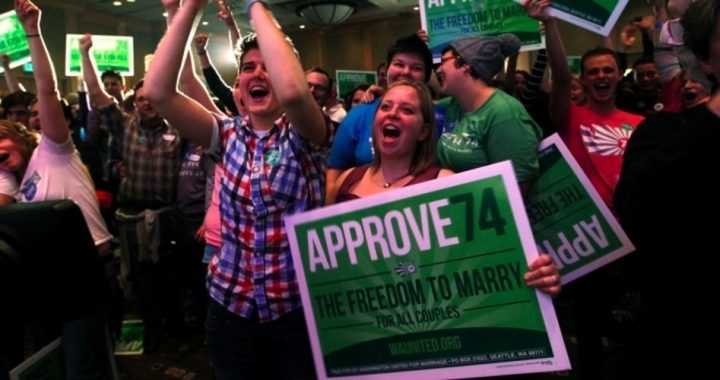
In a major shift in America’s culture wars, advocates of gay marriage won in at least three states Tuesday, as voters in Maine and Maryland voted in legal recognition of same-sex marriage, while Minnesotans shot down a proposed amendment to the state constitution to define marriage as exclusively between a man and a woman. Voters in the state of Washington also had an initiative to legalize same-sex marriage on their ballots Proposition 74, and as of Wednesday afternoon the tallied votes were showing a slight lead in favor of the measure.
Maine and Maryland became the first states to adopt same-sex marriage by popular vote. In Maine it was a reversal of a decision rendered by the voters just three years ago, when they voted in November of 2009 to repeal a same-sex marriage law approved by the legislature and signed by the governor earlier that year. This time, proponents of the change led by Mainers United for Marriage bypassed the legislature and appealed directly to the voters by petitioning to get the issue on the ballot as Question 1 in Tuesday’s election. Unofficial results, based on 89 percent of the votes counted, showed 53 percent of voters in support of the change and 47 percent opposed by Wednesday afternoon.
In Maryland, Governor Martin O’Malley, a Democrat, pushed a same-sex marriage law through the state legislature, but opponents petitioned to have the matter decided by voters in a referendum. It appeared on the ballot as Question 6. With votes from 97 percent of the precincts counted, 52 percent approved of the change to the state’s marriage law.
“I think it says a lot about the goodness of the people of our state, and I think it says a lot about the way that we cherish our diversity as a strength,” O’Malley told the Associated Press. With 97 percent of Maryland precincts reporting, the change to the marriage law was approved by 52 percent of the voters. Tuesday’s voting provided the first endorsements of same-sex marriage by referendum, after voters in various states had rejected the proposal 32 times. Massachusetts was the first state to adopt same-sex marriage, following a 2003 ruling by the state’s Supreme Court. In the five states and the District of Columbia that have adopted similar laws, the change was made either by legislative action or judicial decree, or both. Connecticut, Iowa, New Hampshire, New York, and Vermont are the other states that have granted legal status to same-sex marriage.
In Minnesota, the attempt to define the traditional concept of marriage in the state constitution, as 30 other states have done, received the support of less than 48 percent of the voters, with 99 percent of the precincts counted. A statute defining marriage as exclusively a man-woman relationship remains on the books, though that could be altered or repealed by an act of the legislature or challenged in court as a denial of equal rights. While the 14th Amendment to the U.S. Constitution forbids any state to deny persons “equal protection of the laws,” the relevance of that 1868 amendment to the relatively new controversy over same-sex marriage will surely be contested by gay marriage opponents.
Photo of supporters of Washington’s Proposition 74 cheering during an election watch party: AP Images



